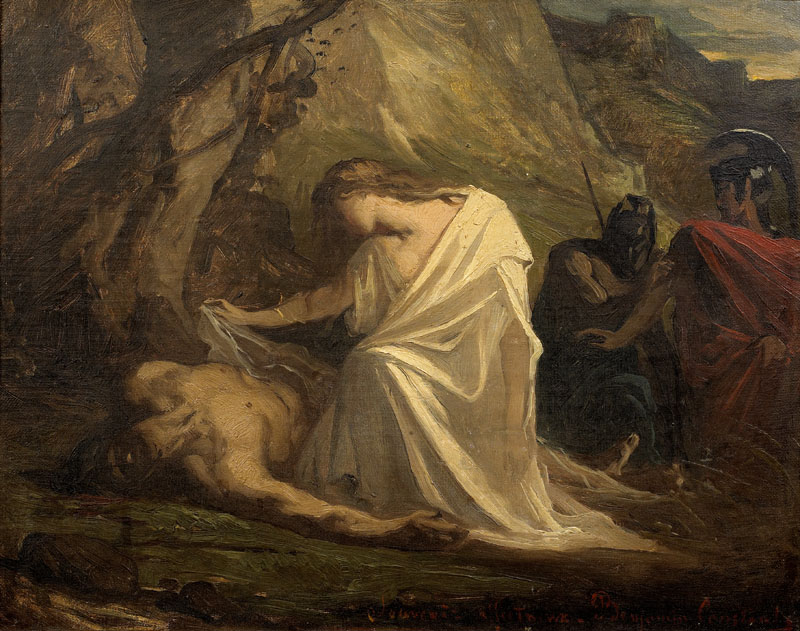Photo: “Antigone au chevet de Polynice” (1868) by Jean-Joseph Benjamin-Constant (1845-1902). Oil on Canvas, courtesy of Wikimedia Commons, public domain.
Sophocles’ classical Greek play, Antigone, holds several lessons on humility, hubris, and honor. We will explore how these concepts apply to traditions, and discuss how we modern humans should approach the traditions passed from long ago.
Summary of Antigone
Antigone is one of three plays in the Oedipus Cycle written by Sophocles. The series tells the story of King Oedipus, namesake of the Oedipal complex, who rules the city of Thebes. Oedipus has four children- two daughters, Antigone and Ismene, and two sons, Polyneices and Eteocles. Before the events of the Antigone play, Oedipus has died and his son Eteocles ascends to rule. Polyneices launches an attack against Thebes for the throne, during which he and Eteocles kill one another. Oedipus’ brother in law, Creon, then takes the throne.
Antigone opens on the newly crowned king Creon, his step-daughter Antigone, and the question of whether to bury the fallen Polyneices, who started this civil war. Creon declares Polyneices’ body will remain in the streets as a sign of dishonor. Creon sees Polyneices’ campaign as an act of treason against Thebes, and sees dishonor as the only fitting response. Antigone, however, can not bear to see her brother dishonored in death, and knows the gods will require a proper burial. She defies Creon’s order, choosing to honor the gods and her brother. Antigone tells her sister her plan, which horrifies Ismene. Ismene refuses to go against Creon’s order. Antigone manages to perform some burial treatments on Polyneices unseen. The next morning, all can see Polyneices’ body has been treated, though, and unsurprisingly, this act doesn’t go over well with Creon. He furiously demands to know who attended the body. When the guards bring Antigone before Creon, he sentences her to death.
The Greeks believed the gods controlled everything from the crops they harvested to the weather conditions. These same gods demanded the city’s dead be buried so they may continue their journey through the afterlife unimpeded. The gods would be angered by Creon’s demand,as his inner circle tries to convince him. Antigone knows this, and by attempting to bury Polyneices, she attempts to avert their wrath. While Antigone is acting out of selfless concern for her brother and the city by satisfying the gods’ demands, ego-laden Creon acts only in his self-interest. He is only concerned with imposing his will and demanding respect, rather than considering what is best for everyone involved. Creon neglected to consider this dilemma when making his declaration to his counselors, implementing an order which appealed only to his pride and not the betterment of society.
Creon’s ego proves to be his undoing, while Antigone’s heroic actions reflect dishonor on Creon and his unjust declaration. Instead of taking a step back and realizing his own rule and life are subject to the gods, Creon attempts to assert his own power. Creon’s son, who is engaged to Antigone, kills himself upon learning of Antigone’s death. Creon’s devastated wife then kills herself. Beginning with an ill-considered, ego-fueled judgment, then doubling down and refusing to reconsider, Creon ends the play completely alone. His hubris causes the deaths of his wife, and son – his would-be heir. Thus, Creon secures his place in a shameful legacy, and plunges Thebes right back into a swirl of death and tragedy.
Lessons from Antigone
“It was not God’s proclamation. That final Justice which rules the world below makes no such laws.
-Antigone, Scene Two, Antigone.
Your edict, King, was strong, but all your strength is weakness itself against the immortal unrecorded laws of God. They are not merely now; they were, and shall be, operative for ever beyond man utterly.”
Antigone, for her part, never hesitates to do the right thing, which is to say, fulfilling the requirements of the gods. In deciding to bury her brother she willfully defies Creon’s command. This doesn’t cause her to doesn’t fear the consequences or her own death, though. Instead she fears the wrath of the gods incensed by Polyneices being left in the street. She knows the gods’ commands along with and Creon’s edict, but would rather risk angering the king than the gods. Who knows how many lives might be destroyed in the gods’ fury? This renders her act of honoring her brother all the more selfless. She is risking her life, not only for the honor of her brother and family, but in part to spare the entire city.
Antigone’s boldness inspires her sister and others to stand up for their age-old traditions and honor, causing the gods to favor them. Antigone didn’t set out to inspire anyone; she simply couldn’t allow her brother to be dishonored in death. Her actions were purely motivated by humility and honor.
Lessons from Creon
“There is no happiness where there is no wisdom;
-Chorus, Final Scene, Antigone.
No wisdom but in submission to the gods.
Big words are always punished,
And proud men in old age learn to be wise.”
It’s interesting just how determined Creon is to rush in and prove himself as king. He seems to want to prove his own brutal adherence to the law, forgetting who rules the affairs of men and kings. We can draw several lessons from Creon’s mistakes, not the least of which is humility.
Don’t let ego convince you to defend a poor decision. Creon should serve as a caution to us all; if you see you’ve made a mistake, just work to correct it from there. Ego doesn’t lead to productive decisions, but to a dizzying maze of trying to assert yourself, often against prudent reason and authority. Make the best decision you can and get back on track. Ego blinds our minds to reason, but humility will allow you to make the right decision and move forward. As Creon illustrates, attempting to save face by persisting with a series of bad choices is a terrible decision.
The consequences of our decisions usually affect those around us, not just ourselves. We should consider the second- or third-order effects our decisions put in motion. Creon only thought about his ego and proving himself on the throne, giving no attention to how the implications of his choices might influence others despite ample opportunity. It doesn’t take being a king or CEO to realize your actions matter. The habits you employ and the largest decisions you make affect everyone from your household, to those you interact with daily, to those who will read the things you write, produce, post, etc. We never know the full extent of our influence.
We should keep people around us who will see what we can’t – and will honestly tell us when we are making a mistake. Creon could have taken advice from his council. He should have surrounded himself from the beginning with counselors and advisers who would have alerted him to this blind spot, saving everyone much grief. By failing to do so, he ensured his rule was riddled with weakness and vulnerable to oversight. Creon trusted his own thoughts and railed against sound advice to see his ideas through. We have to make sure to keep trusted friends close and listen to their counsel when they offer it. Again, this requires a humility and a willingness to listen to other perspectives.
We should look at tradition with patience, and an eye toward gaining insight. We should be respectful of past generations and societies not dismissive, honoring and not despising tradition. We should approach tradition, again, with humility, not hubris. Tradition is the blending together of generations of knowledge into a process or avoidance of certain substances or areas. Instead of dismissing them as superstition and invalid, we should investigate why they exist and what purpose they serve beyond community building. Creon bucks the religious and cultural tradition in favor of his own ideas, coming to regret it miserably. Creon’s fate cautions not only against ego, but also the dangers of shrugging off tradition without thinking about its potential outcomes. Ego places opinion above tradition. We should approach traditions and customs with a humility – not dismiss them unexamined as irrational nonsense. Creon rushed in with his own ideas about who should or should not receive honor or punishment, even after death. In doing so, he violated the laws of the gods, and was left in ruins.
Antigone as embodying tradition
Tradition is a tricky thing. Longstanding traditions are passed down from cultures and civilizations who adopted, altered, and passed them on over thousands of years. They often begin from the human impulse to make sense of disasters, to ascribe meaning to devastating events like death, massive flooding, or a bad cycle of crops, and take on the form of myths. In our example from Antigone, the city is ordered to leave a body in the street, to the elements. From a strictly biological standpoint, we know that decomposition is a rather foul process, what with flesh giving off strong odors and attracting scavengers and potentially dangerous wildlife. These animals and pests can then spread infectious diseases to the human population nearby, in this case the city. The ancient Greek tradition taught that the gods would be angered and kill many people if the dead were dishonored. The result is the same – many people would die premature and painful deaths, plunging the city into a crisis.
We continue to treat and bury the departed today, not purely out of tradition or honor – though those certainly are true. We have sanitary reasons for these practices, as well. We understand bacteria and diseases and the risks of not taking proper measures. The tradition of burying the dead has an underlying health reason.
Analyzing Antigone’s choice as an honoring of tradition holds across several levels. First, she defends the honor of the gods and Polyneices. Second, she stands against an unjust law, suffering for doing justly. Third, it’s possible she saved the city from an outbreak of plague or other disease. Finally, she provides a courageous example of humbly standing against ego and tyranny, even at great personal cost. Antigone knew that obeying the laws of the gods superseded obeying the law of a king.
Creon throws off tradition because it doesn’t suit his agenda, and in fact, makes the tradition a crime. Antigone considers her options and chooses to act in line with tradition.
How should we modern minds approach tradition?
We should be investigate and evaluate traditions to determine why they became traditional in the first place.
How should we approach traditions?
More than a thousand years later, English author GK Chesterton illustrated this perspective with his fence metaphor:
“The more modern type of reformer goes gaily up to [a fence] and says, “I don’t see the use of this; let us clear it away.” To which the more intelligent type of reformer will do well to answer: “If you don’t see the use of it, I certainly won’t let you clear it away. Go away and think. Then, when you can come back and tell me that you do see the use of it, I may allow you to destroy it.”
—G.K. Chesterton, The Thing (1929)
One should not remove a fence until and unless one knows the reason it was originally put up.
Traditions are often built from a cultural or religious standpoint of avoiding ruin. Whether it’s to ensure financial wealth or heal an illness, most traditions start out as ways to avoid dying. Over time they became taboo throughout society. For example, the tradition and subsequent taboo around not eating blood was inherited from past generations, before we understood the importance of cooking meat to kill pathogens. In these traditions, the blood of an animal was avoided for fear of contracting a disease, though many of these traditions take on religious or spiritual significance.
Traditions often end up getting repeated and refined so many times we don’t know why or how they began. Chesterton argues that one should not do away with a tradition unless one knows why the tradition was begun; that is, the purpose for the tradition. There are countless historical examples, many illustrated in the above referenced Scholar’s Stage essay, of traditions which are passed down and honored, but don’t seem to accomplish much. Such customs should spark interest and curiosity, not dismissal. There is a reason our ancestors didn’t eat certain fish or prepare foods a certain way. Eating fish high in mercury can be fatal for a pregnant woman; certain berries and seeds need to be boiled to release nutrients before they can be eaten. Dismissing those customs as “folk tales” or the wild way of doing things is a great way to get killed.
Often, science catches up and proves tradition somewhat right. Keeping meat cold or fully cooked are normal food safety practices today, because we have learned about pathogens and illness over time.The accumulated wisdom built from dozens of generations of people are what enabled society and human life to progress into the modern era. Today we understand the tradition of not eating blood was how people avoided getting ill from eating meat. The very traditions many would shrug off as superstitious or silly may be rooted in simply staying alive. The tradition may very well be there for good reason.
As Joseph Henrich writes in The Secret of Our Success,
“The point here is that cultural evolution is often much smarter than we are. Operating over generations as individuals unconsciously attend to and learn from more successful, prestigious, and healthier members of their communities, this evolutionary process generates cultural adaptations.”
via Scholar’s Stage, “Tradition is Smarter Than You Are”
Of course, some traditions and beliefs are revealed to be less than helpful. As Chesterton cautions, it is necessary to first know the underlying purpose of the tradition to assess its accuracy and utility. The point is to approach the past and traditions with a sense of humility, rather than opinion; asking questions, not making declarations.
Traditions are not simply one person’s idea of having fun with the kids. They are the accumulation of generations of wisdom, the observations from thousands of people over the centuries, all distilled into a few traditional ways of staying alive. More simply put, some of the things we pass off as “old wives’ tales” or superstitious nonsense is actually the wisdom accumulated across many generations of a people learning to survive their environment.
J.R.R. Tolkien expresses this beautifully in The Fellowship of the Ring. The wise Elf-king Celeborn remarks to the dismissive Boromir, “[D]o not despise the wisdom that has come down from distant years; for oft it may chance that old wives keep in memory word of things that once were needful for the wise to know.”
Some final thoughts
It would be nice to tie this idea into a neat bow, saying “do this or do not do that” with such a tradition. However, any one size fits all approach would be a disservice to the richness of history and dismissive of the importance of critical thought. Indeed, there are many questions to consider when looking at traditions and how the modern mind should approach them. We’ve already determined we need to know what purpose the tradition originally served. Like Antigone, we must remember that we are all subject to laws and forces larger than ourselves. We can’t control events, but we do control our responses. How we approach decisions, whether regarding tradition or not, is entirely within our control.
Footnote: All quotes from Antigone are from the Dudley Fitts and Robert Fitzgerald English translation.




